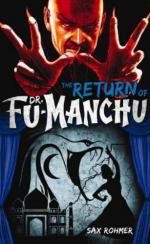But not a sound broke the stillness save a remote murmuring, until a solitary sea gull rose in the air and circled directly over the tower, uttering its mournful and unmusical cry. Automatically to my mind sprang the lines of the poem:
Far from all brother-men,
in the weird of the fen,
With God’s creatures
I bide, ’mid the birds that I ken;
Where the winds ever dree,
where the hymn of the sea
Brings a message of peace
from the ocean to me.
Not a soul was visible about the premises; there was no sound of human activity and no dog barked. Nayland Smith drew a long breath, glanced back along the way we had come, then went on, following the wall, I beside him, until we came to the gate. It was unfastened, and we walked up the stone path through a wilderness of weeds. Four windows of the house were visible, two on the ground floor and two above. Those on the ground floor were heavily boarded up, those above, though glazed, boasted neither blinds nor curtains. Cragmire Tower showed not the slightest evidence of tenancy.
We mounted three steps and stood before a tremendously massive oaken door. An iron bell-pull, ancient and rusty, hung on the right of the door, and Smith, giving me an odd glance, seized the ring and tugged it.
From somewhere within the building answered a mournful clangor, a cracked and toneless jangle, which, seeming to echo through empty apartments, sought and found an exit apparently by way of one of the openings in the round tower; for it was from above our heads that the noise came to us.
It died away, that eerie ringing—that clanging so dismal that it could chill my heart even then with the bright sunlight streaming down out of the blue; it awoke no other response than the mournful cry of the sea gull circling over our heads. Silence fell. We looked at one another, and we were both about to express a mutual doubt when, unheralded by any unfastening of bolts or bars, the oaken door was opened, and a huge mulatto, dressed in white, stood there regarding us.
I started nervously, for the apparition was so unexpected, but Nayland Smith, without evidence of surprise, thrust a card into the man’s hand.
“Take my card to Mr. Van Roon, and say that I wish to see him on important business,” he directed, authoritatively.
The mulatto bowed and retired. His white figure seemed to be swallowed up by the darkness within, for beyond the patch of uncarpeted floor revealed by the peeping sunlight, was a barn-like place of densest shadow. I was about to speak, but Smith laid his hand upon my arm warningly, as, out from the shadows the mulatto returned. He stood on the right of the door and bowed again.
“Be pleased to enter,” he said, in his harsh, negro voice. “Mr. Van Roon will see you.”
The gladness of the sun could no longer stir me; a chill and sense of foreboding bore me company, as beside Nayland Smith I entered Cragmire Tower.




